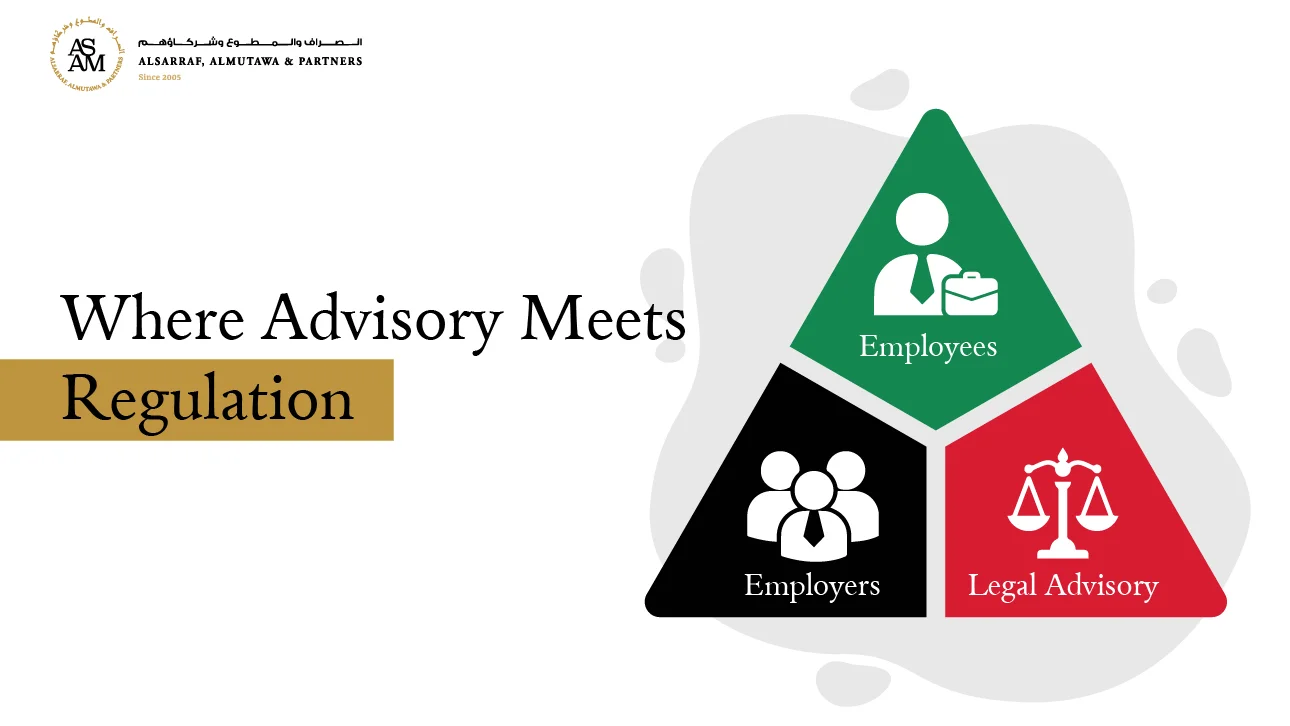

Labor laws have been changing regularly over the past few years in Kuwait. These changes are confusing both employees and employers. Both will have to follow these laws to maintain compliance. When employer–employee interactions span public–private or multi-jurisdictional arrangements, it causes more confusion.
In this article, we will discuss the role of the Kuwait Labor Law Advisory. We will explain amendments carried out by the Public Authority for Manpower (PAM) and supervised by the Ministry of Social Affairs and Labor (MOSAL).
Moreover, we will suggest a professional platform, ASAM & Partners, for a deep understanding of these Labor-law frameworks in Kuwait.

The greater volume, complexity, and dynamism of Kuwait’s Labor regulations require support. That is why Labor-law advisory services include the understanding and acceptance of regulations in this law. These are important for both employers and employees, especially as the demand for legal advisory services Kuwait continues to grow.
Employers should make sure that employment services are in line with the prevailing law. These practices include employment contracts, payroll, overtime, end-of-service gratuity, leave entitlements, and termination practices. For example, written contracts in Arabic are required, and the Arabic version of the contract prevails in matters of dispute.
Those who do not follow these regulations face fines and penalties. Thus, this has increased the demand for specialized Kuwait Labor-law advisory services.
Most employees in the Kuwaiti private sector belong to different nationalities. The legal advisory addresses visa/work-permit matters, Labor-contract conversion, wage protection, and national-employee requirements. Advisory services are bilingual and informed about foreign-worker sponsorship systems and regulatory developments. Thus, a diverse workforce increases the demand for professional advice.
Nowadays, people expect more than advisory services. They want a proactive strategy to solve all Labor-related issues. They want to link workforce policy to business goals, manage the risk of claims/disputes, benchmark against international Labor standards, and implement compliance frameworks.
In this modern world, technology is incorporated in every field. Daily attendance, work schedules, and administration operate online in Kuwait. In this case, advisory services should be able to handle Labor law with the aspect of innovation.

Labor-law changes affect employees; similarly, they also affect employers. Employers must maintain compliance in their practices. That is why they work according to these changes. This compliance needs to be regularly updated, increasing the need for Labor-law advisory for employers.
It is the duty of employers to ensure that employment contracts are in line with prevailing statutory provisions. This includes probation, termination notice, working hours, leave entitlements, end-of-service gratuity provisions, and overtime terms in standard language (Arabic). You should:
● Check the current employment agreements to make sure that they comply with recent laws and regulations (e.g., Article 28, Article 64 of the Labor Law).
● Revise new contracts according to new policies (e.g., cover the new reporting requirements to PAM, disclosure of schedule/holiday information).
Employers should incorporate compliance in HR policies and operations. Advisory services are important in:
● Helping with designing HR manuals and HR policies (e.g., overtime, rest breaks, leave, sick leave) to match the new law.
● Educating HR teams and line managers on the new requirements, e.g., making sure that schedule/holiday reporting to the PAM e-system is handled properly.
The alteration of Labor law and administrative enforcement leads to the risk of many disputes in companies. These disputes include employee claims, termination challenges, and Labor-court filings. Advisory services:
● Carry out analysis of employment procedures and practices, including termination without proper notice, deductions from wages, and contract breaches.
● Recommend correct documentation, evidence maintenance, incident management, and internal investigations.
● Represent employers in the resolution of disputes or mediation with PAM (Public Authority for Manpower).
Professional advisory services work according to Labor-law changes in Kuwait. This helps them understand the needs of employers and employees. Some key areas on which advisory should focus are as follows:
Labor law determines maximum hours of work (48 hours/week), a one-hour rest after five consecutive hours, fewer hours during Ramadan, and increased payment for overtime. Advisory services help companies in structuring schedules, recording overtime, and ensuring digital reporting.
According to Articles 28 & 29 of the Labor law, advisory services must verify contract wording in Arabic. All Labor contracts should be in Arabic (translation is optional).
The updated law shows sick leave (full pay for the first 15 days, then gradually reduced pay) and annual leave after nine months of service. Advisory services should help monitor entitlements, draft policies, implement tracking systems, and prepare for disputes.
Employers should calculate gratuity based on service years, type of contract, and legislation. Employees must be aware of their rights. Advisory services should assist in the interpretation of the law (with amendments) and the preparation of termination notices and severance packages.
According to updates from the Kuwait Ministry of Social Affairs and Labor (from 1 Nov 2025), employers and employees will submit work schedules and rest periods electronically. Based on this change, advisory services will advise on systems, processes, internal controls, training, and the interface with the e-portal of PAM.
Many employees in Kuwait are not native. They have specific Labor rules regarding visas and sponsorship. Kuwait Labor Law Advisory should assist with visa/work-permit transfers, sponsor-transfer issues, and contractual protections.
ASAM & Partners offers complete Kuwait Labor-law advisory services to employers and employees in the dynamic regulatory sector. Their practice unites bilingual legal professionals with solid experience in the field of employment law. As part of their broader legal practice areas, they provide structured guidance to help employers and employees navigate Labor-law complexities effectively.
For employers, they offer services in contract drafting, audits, HR policy formulation, training for both HR and operational employees, risk assessment, and representation in Labor-dispute cases. They work according to the guidelines of the Kuwaiti Civil Service Commission (CSC) to maintain compliance.
For employees, they offer rights-education programs, contract-review programs, grievance-support services, and representation in employment-law cases. They work according to the guidelines of the International Labor Organization (ILO).
With pressures from global Labor standards, technology, and economic diversification in Kuwait, ASAM & Partners is your trusted partner. Whether you are seeking proactive compliance, risk mitigation, or realization of rights under Kuwait’s Labor framework, they tailor their advice to your specific context, sector, and workforce composition.
In summary, the evolving Labor-law regime is making Kuwait Labor-law advisory services more vital than ever. The law updates include contract requirements, digital-compliance obligations, enhanced worker protections, and a more sophisticated administrative framework. Whether you are an employer seeking to ensure “workforce compliance Kuwait” or an employee wishing to understand your rights under the “Kuwait Labor-law update,” the role of specialized legal advisory cannot be overlooked.
ASAM & Partners is ready to support both sides of the employment relationship with up-to-date, strategic advice rooted in deep knowledge of Kuwait’s Labor-law ecosystem.
What exactly does “Kuwait Labor Law Advisory” mean?
It refers to legal and compliance advisory services in Kuwait that help employers and employees understand, implement, and comply with the country’s Labor laws. It includes contract drafting/review, HR policy advice, compliance audits, dispute resolution, and strategic workforce governance.
How often does the Labor law in Kuwait change, and how do I stay updated?
While the foundational law (Law No. 6 of 2010) remains in force, amendments, regulatory decrees, and administrative obligations are updated periodically. For example, a new e-reporting requirement came into force in November 2025. Advisory firms monitor these updates, publish bulletins, and provide training to ensure both employers and employees keep pace.
As an employer, what are the key risks if I fail to adapt to the Labor-law updates?
Risks include Labor complaints, fines, reputational harm, inability to defend termination claims, invalid or unenforceable contracts, exposure to arbitration or Labor-court claims, and potential difficulties with expatriate-workforce management (e.g., visa/sponsorship issues).
As an employee (especially an expatriate), how might these law changes affect me?
You may see stronger enforcement of your rights (in areas such as contract terms, leave, overtime, and end-of-service benefits), better access to advisory services to protect your interests, and more clarity around employer obligations (helping you make informed career/contract decisions). Advisory support can help you review your contract, understand your entitlements, and respond if your rights are violated.
How can ASAM & Partners help me with these advisory needs?
At ASAM & Partners, we offer tailored advisory solutions: for employers, we provide contract drafting, HR policy design, compliance audits, training, and dispute representation. For employees, we provide contract review, rights-awareness support, and dispute guidance.